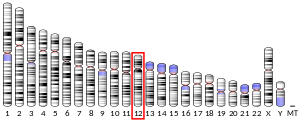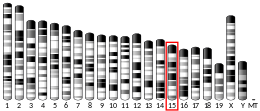Copine-8 is a protein that in humans is encoded by the CPNE8 gene .[ 5] [ 6]
Calcium -dependent membrane-binding proteins may regulate molecular events at the interface of the cell membrane and cytoplasm . This gene is one of several genes that encode a calcium-dependent protein containing two N-terminal type II C2 domains and an integrin A domain-like sequence in the C-terminus .[ 6]
^ a b c GRCh38: Ensembl release 89: ENSG00000139117 – Ensembl , May 2017^ a b c GRCm38: Ensembl release 89: ENSMUSG00000052560 – Ensembl , May 2017^ "Human PubMed Reference:" . National Center for Biotechnology Information, U.S. National Library of Medicine .^ "Mouse PubMed Reference:" . National Center for Biotechnology Information, U.S. National Library of Medicine .^ Maitra R, Grigoryev DN, Bera TK, Pastan IH, Lee B (Apr 2003). "Cloning, molecular characterization, and expression analysis of Copine 8" . Biochem Biophys Res Commun . 303 (3): 842–847. doi :10.1016/S0006-291X(03)00445-5 . PMID 12670487 . ^ a b "Entrez Gene: CPNE8 copine VIII" .
Creutz CE, Tomsig JL, Snyder SL, et al. (1998). "The copines, a novel class of C2 domain-containing, calcium-dependent, phospholipid-binding proteins conserved from Paramecium to humans" . J. Biol. Chem . 273 (3): 1393–1402. doi :10.1074/jbc.273.3.1393 PMID 9430674 . Hartley JL, Temple GF, Brasch MA (2001). "DNA cloning using in vitro site-specific recombination" . Genome Res . 10 (11): 1788–1795. doi :10.1101/gr.143000 . PMC 310948 PMID 11076863 . Tomsig JL, Creutz CE (2001). "Biochemical characterization of copine: a ubiquitous Ca2+-dependent, phospholipid-binding protein". Biochemistry . 39 (51): 16163–16175. doi :10.1021/bi0019949 . PMID 11123945 . Wiemann S, Weil B, Wellenreuther R, et al. (2001). "Toward a catalog of human genes and proteins: sequencing and analysis of 500 novel complete protein coding human cDNAs" . Genome Res . 11 (3): 422–435. doi :10.1101/gr.GR1547R . PMC 311072 PMID 11230166 . Strausberg RL, Feingold EA, Grouse LH, et al. (2003). "Generation and initial analysis of more than 15,000 full-length human and mouse cDNA sequences" . Proc. Natl. Acad. Sci. U.S.A . 99 (26): 16899–16903. Bibcode :2002PNAS...9916899M . doi :10.1073/pnas.242603899 PMC 139241 PMID 12477932 . Ramsey H, Zhang DE, Richkind K, et al. (2003). "Fusion of AML1/Runx1 to copine VIII, a novel member of the copine family, in an aggressive acute myelogenous leukemia with t(12;21) translocation" . Leukemia . 17 (8): 1665–1666. doi :10.1038/sj.leu.2403048 PMID 12886257 . Ota T, Suzuki Y, Nishikawa T, et al. (2004). "Complete sequencing and characterization of 21,243 full-length human cDNAs" . Nat. Genet . 36 (1): 40–45. doi :10.1038/ng1285 PMID 14702039 . Gerhard DS, Wagner L, Feingold EA, et al. (2004). "The status, quality, and expansion of the NIH full-length cDNA project: the Mammalian Gene Collection (MGC)" . Genome Res . 14 (10B): 2121–2127. doi :10.1101/gr.2596504 . PMC 528928 PMID 15489334 . Wiemann S, Arlt D, Huber W, et al. (2004). "From ORFeome to biology: a functional genomics pipeline" . Genome Res . 14 (10B): 2136–2144. doi :10.1101/gr.2576704 . PMC 528930 PMID 15489336 . Mehrle A, Rosenfelder H, Schupp I, et al. (2006). "The LIFEdb database in 2006" . Nucleic Acids Res . 34 (Database issue): D415–D418. doi :10.1093/nar/gkj139 . PMC 1347501 PMID 16381901 .



